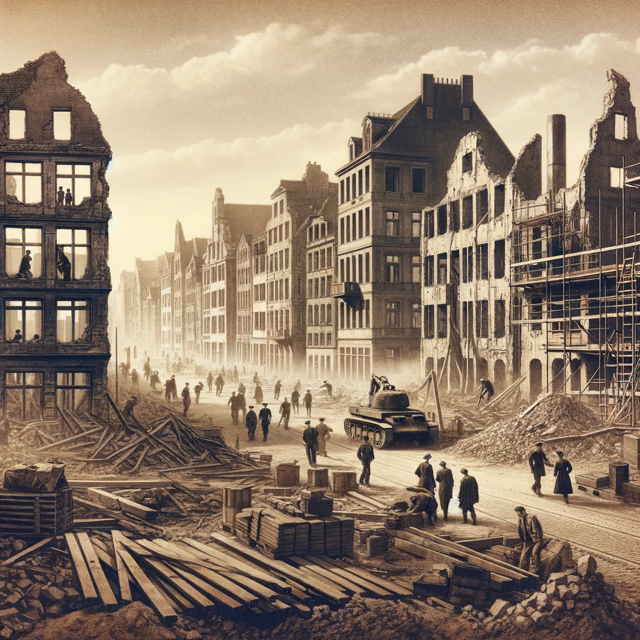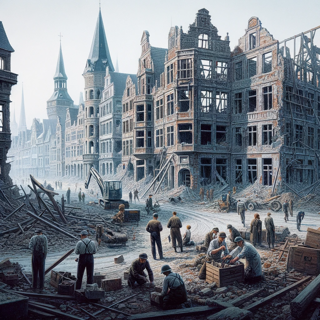January 2024
Step into the tumultuous world of post-war Germany through the eyes of Bruno and Karla, a couple whose resilience in the face of adversity paints a vivid picture of a nation divided and rebuilding. "Surviving the Split: A Family's Tale in Post-War Germany" invites you on a gripping journey through the bombed streets of Kiel, the economic miracles of West Germany, and the stark realities of life under Soviet rule in the East. Discover how love, determination, and the simple joys of family life triumphed over the chaos of a country torn apart by war. This story is not just a chronicle of historical events; it's an intimate portrayal of hope amidst ruins, and the enduring human spirit that binds us all. Join us in uncovering a tale of survival, resilience, and the unbreakable bonds of family in a time when everything seemed lost.
Last updated 20 months ago
Will publish on 06/07/2026
A Family's Survival: Endurance and Change in Post-War Germany
By Monica Granlove
Bruno, the main character in the novel The Electrician and The Seamstress, embarked on a harrowing journey, leaving his family in April 1944, and returning in March 1947, only to find his beloved city, Kiel, decimated by bombs. The Allies had targeted Kiel due to its strategic importance as a major port and Naval base. Between the war's end on May 8, 1945, and November 1946, Bruno traversed Siberia, navigating the perilous elements to reach US-led Austria. Cut off from information, he had no knowledge of his family's well-being, compounded by strict USSR government control over media and the inherent risks for a German walking across USSR, given the lingering animosity.
The 1950s marked a significant period of reconstruction and transformation for Germany. In the immediate aftermath of World War II, Germany lay in ruins. The extensive Allied bombing campaigns had devastated cities and infrastructure. Over 90% of Kiel was bombed out. The post-war years saw extensive reconstruction efforts, with a focus on rebuilding cities, industries, and homes.
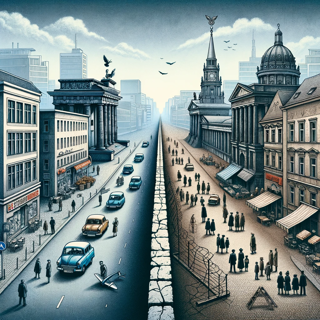
The division of Germany into East and West continued during the 1950s. The Federal Republic of Germany (West Germany) was established in 1949, while the German Democratic Republic (East Germany) was formed in the same year. The division was a result of geopolitical tensions between the Western Allies and the Soviet Union.
Life in East Germany during the 1950s was shaped by the political ideology of the ruling Socialist Unity Party (SED), the influence of the Soviet Union, and the broader context of the Cold War. The German Democratic Republic was officially established in 1949 as a socialist state in the Soviet-occupied zone of Germany. The political structure was influenced by Soviet-style socialism, and the SED, led by Walter Ulbricht, held a dominant position.
Socialist principles were central to life in East Germany. The state sought to control various aspects of society, including the economy, media, education, and cultural institutions. The government aimed to create a socialist society based on the principles of equality and collectivism.
In the early 1950s, East Germany underwent a process of "Stalinization," aligning its policies with those of the Soviet Union under Joseph Stalin. This period saw the suppression of dissent, political purges, and the establishment of a repressive state apparatus, including the Ministry for State Security (Stasi). East Germany followed a centrally planned economy, where the state controlled major industries and agricultural production. Small farms were amalgamated into larger state-controlled agricultural cooperatives, known as LPGs (Landwirtschaftliche Produktionsgenossenschaften). The economic model focused on achieving socialism and providing basic necessities to the population. However, it faced challenges, including inefficiency and a lack of consumer goods.
The educational system in East Germany was heavily influenced by socialist principles. The state aimed to instill socialist values in students, and there was an emphasis on political education. The curriculum reflected the ideological framework of the ruling party. Although the Hitler Youth was disbanded in 1945, the Soviets created The Free German Youth (Freie Deutsche Jugend or FDJ) as the official youth organization. Participation was encouraged as a means of ideological indoctrination.
Women in East Germany were encouraged to participate in the workforce and were granted equal legal rights. However, societal expectations often placed a burden on women to balance work and family life. The state aimed to redefine traditional gender roles, but the reality often fell short of the ideals. Citizens of East Germany faced restrictions on travel, particularly to West Germany. The Stasi closely monitored individuals, and those expressing dissent or attempting to escape faced severe consequences, similar to the Gestapo of Nazi Germany.
Could you imagine living in Germany in the 1950's when politicians split Germany up into East and West? What if you were living on the side you didn't want to and couldn't afford to move? Or perhaps there wasn't enough information about what it would mean to be under Soviet rule. In 1961, the East German government, with Soviet approval, erected the Berlin Wall to prevent citizens from defecting to West Germany. The wall became a symbol of the division between East and West during the Cold War until the fall of communism in Europe in 1989.
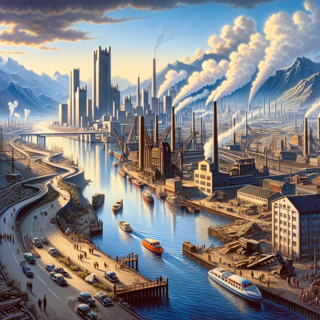
Meanwhile, people in West Germany experienced a remarkable economic recovery during the 1950s, commonly referred to as the "Wirtschaftswunder." This period of rapid economic growth was characterized by industrial expansion, increased productivity, and a rise in living standards. Key factors contributing to this recovery included the Marshall Plan (investment from the United States), currency reform, and the establishment of the European Coal and Steel Community.
Konrad Adenauer, the first Chancellor of West Germany, played a crucial role in shaping the country's post-war destiny. He served from 1949 to 1963 and was instrumental in the economic recovery, integration into Western alliances, and the development of a stable democratic system. West Germany became a key member of Western alliances, including the North Atlantic Treaty Organization (NATO). This alignment was part of the broader Cold War dynamics, with West Germany firmly positioned within the Western bloc.
In addition to economic reconstruction, efforts were made to rebuild German society. Institutions, educational systems, and political structures were reestablished. The German Basic Law (Grundgesetz) was adopted in 1949, laying the foundation for the country's democratic governance. The 1950s witnessed a cultural revival in West Germany. There was a resurgence in literature, music, and cinema. The period saw the emergence of the "Heimatfilm" genre in German cinema, focusing on themes of homeland and nostalgia.
Social changes in West Germany included the rebuilding of families and communities. Women entered the workforce, and there was a gradual shift toward more liberal social attitudes. The formation of youth subcultures, such as the "Halbstarken," reflected generational changes. The 1950s also saw the integration of millions of German refugees and expellees who had fled or were expelled from Eastern European countries after the war.
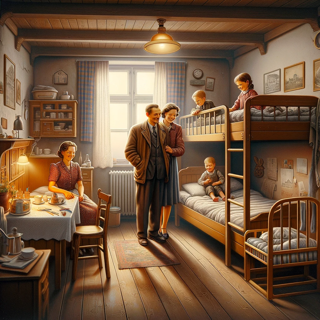
My maternal grandfather, Bruno, from the novel The Electrician and The Seamstress, was well known in Kiel, Hamburg, and the surrounding areas so had an extensive network of people. He was a social and gregarious man who could fix anything, including diffusing the many bombs that did not detonate. Although Bruno lived in West Germany, he heard stories about the East through family and friends.
In the 1950s Bruno and my maternal grandmother Karla survived week over week. They had a one-bedroom apartment with rent at 40 Marks a month. Bruno and Karla shared a double bed in the same room with their children, Edith and Rolph, in bunkbeds. The baby, Brunhilde, was in the corner in a bassinet Bruno made. There was so much chaos, Bruno and Karla took odd jobs to keep the family afloat. There were no new shoes or new coats. Everything was repaired until there was no hope of repairing. Bruno was also called to disarm bombs that fell from warplanes but hadn’t detonated, a job Karla was terrified of. Despite the financial challenges, the family was happy to spend time together.
Karla often went for coffee with friends and the children stayed active with their friends. Eventually, Bruno was able to get a job at the shipyard as an electrician. It took nearly fifteen years to feel financially stable. Bruno went on his first plane trip to see Edith in America in 1973 where he smiled a toothless smile warmly at his three-year-old granddaughter, Monica as he sipped his pea soup.
As the 1950s unfolded, Bruno and Karla's story in post-war Germany serves as a poignant reminder of resilience amidst adversity. Navigating through a divided nation, their lives epitomize the struggle and triumph of countless families during a transformative era. From disarming unexploded bombs to savoring simple joys in their one-bedroom apartment, their journey is a testament to the indomitable human spirit. In West Germany, the miraculous economic revival contrasted sharply with life in the East, where political ideology and Soviet influence dictated the everyday. Yet, through it all, Bruno and Karla's enduring love and determination carved a path to stability and hope. Their story, nestled in the heart of a nation split yet striving for recovery, invites us to reflect on the complexities of history and the remarkable resilience of those who lived through it. As we turn the pages of their lives, we are reminded of the powerful legacy of human endurance, the unyielding quest for a better tomorrow, and the profound impact of historical events on individual destinies.
